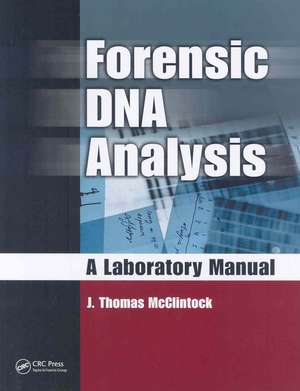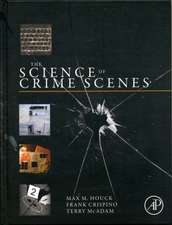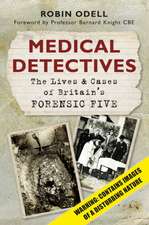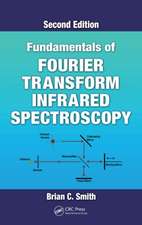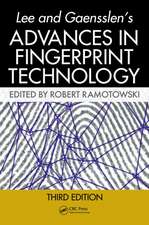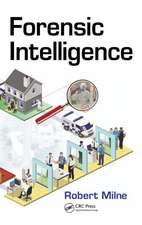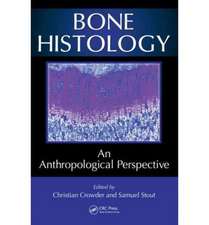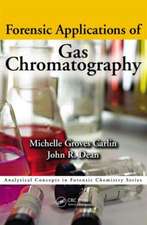Forensic DNA Analysis: A Laboratory Manual
Autor J. Thomas McClintocken Limba Engleză Paperback – 19 feb 2008
An introductory text, Forensic DNA Analysis: A Laboratory Manual presents a contextual history and overview of the science and use of DNA typing. Logically organized, with clear, concise language, this manual provides a fundamental understanding of forensic DNA analysis and a thorough background in the molecular techniques used to determine an individual’s identity. Students are provided with a sound working knowledge of the investigative methodology, scientific principles, and the analysis and interpretation of the resulting data.
After laying a foundation on the rules of the laboratory, the basic scientific principles, and the types of biological materials, such as hair, blood, and bone, this practical, hands-on manual provides 12 exercises outlining techniques commonly used in DNA typing. Designed to be performed in a common laboratory, the experiments cover DNA extraction, concentration, and assessment; DNA analysis using restriction fragment length polymorphisms; polymerase chain reaction and PCR-based typing tests; short tandem repeat analysis; and mitochondrial DNA analysis. Many of the procedures described have been adapted from methods used in federal, state, and private forensic laboratories and are suitable to a wide range of applications. There is also an extensive glossary for DNA typing terminology and basic terms used in molecular biology.
Instilling confidence, analytical clarity, and a sense of curiosity, this comprehensive introduction is the perfect tool for grasping the techniques and applications of forensic DNA analysis and exploring the questions and issues involved in forensic science investigations.
Preț: 448.44 lei
Nou
Puncte Express: 673
Preț estimativ în valută:
85.82€ • 89.09$ • 71.56£
85.82€ • 89.09$ • 71.56£
Carte tipărită la comandă
Livrare economică 24 martie-07 aprilie
Preluare comenzi: 021 569.72.76
Specificații
ISBN-13: 9781420063295
ISBN-10: 1420063294
Pagini: 176
Ilustrații: 24 b/w images and 32 tables
Dimensiuni: 210 x 280 x 10 mm
Greutate: 0.43 kg
Ediția:1
Editura: Taylor & Francis
Colecția CRC Press
Locul publicării:Oxford, United Kingdom
ISBN-10: 1420063294
Pagini: 176
Ilustrații: 24 b/w images and 32 tables
Dimensiuni: 210 x 280 x 10 mm
Greutate: 0.43 kg
Ediția:1
Editura: Taylor & Francis
Colecția CRC Press
Locul publicării:Oxford, United Kingdom
Public țintă
UndergraduateCuprins
An Overview of Forensic DNA Analysis, Types of Biological Samples, Exercise 1 - DNA Extraction, Exercise 2 - Concentration of Extracted DNA, Exercise 3 - Microcon Concentration and Purification of Extracted DNA, Exercise 4 - Assessing the Quality and Quantity of Isolated DNA, Exercise 5 - DNA Analysis Using Restriction Fragment Length, Polymorphism (RFLP), Polymerase Chain Reaction (PCR), Exercise 6 - Polymerase Chain Reaction (PCR)-Based Tests: The AmpliType PM/DQA1 System, Exercise 7 - Polymerase Chain Reaction (PCR)-Based Tests: The D1S80 System, Experiment 8 - Polymerase Chain Reaction (PCR)-Based Tests: Short Tandem Repeat (STR) Analysis, Experiment 9 - Polymerase Chain Reaction (PCR)-Based Tests: Short Tandem Repeat (STR) Analysis to Determine Paternity (a Case Study), Experiment 10 - Polymerase Chain Reaction (PCR)-Based Tests: Y-Chromosome Short Tandem Repeat (Y-STR) Analysis (a Case Study), Exercise 11 - Mitochondrial DNA (mtDNA) Analysis, Exercise 12 - Assessment of Lumigraph and Autoradiograph Data, References, Appendices
Descriere
This introductory text provides a contextual history and overview of the science and use of DNA typing methods. Logically organized, with clear, concise language, this manual ensures a fundamental understanding of forensic DNA analysis and a thorough background of the molecular techniques used to determine an individual’s identity. The experiments cover DNA extraction, concentration, and assessment; DNA analysis using restriction fragment length polymorphisms; polymerase chain reaction and PCR-based typing tests; short tandem repeat analysis; and mitochondrial DNA analysis. There is also an extensive glossary of DNA typing terminology and basic terms used in molecular biology.
